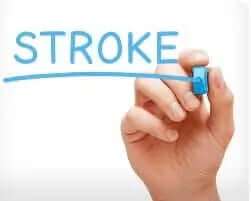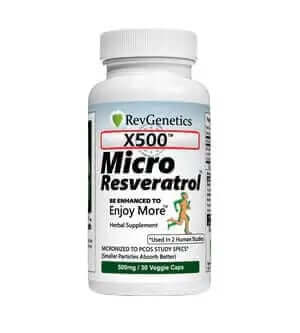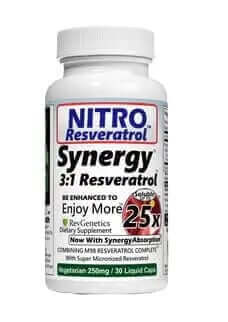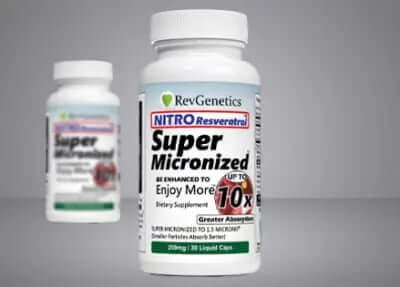Stress Response Revolution: How Resveratrol Protects Your Cells From Daily Stress

Stress affects every cell in your body, but groundbreaking research reveals how resveratrol creates a powerful shield against cellular stress damage. Scientists at The Scripps Research Institute have uncovered a revolutionary mechanism that explains why this natural compound provides such remarkable protection against stress-related aging and disease.
Whether you're dealing with work pressure, environmental toxins, or the natural aging process, understanding how to combat stress at the cellular level becomes essential for maintaining vibrant health. This comprehensive guide explores the latest scientific breakthroughs in stress protection and reveals practical strategies for harnessing resveratrol's protective power.
Understanding Cellular Stress: The Hidden Threat to Your Health
Before diving into resveratrol's protective mechanisms, it's crucial to understand what cellular stress really means. Unlike the emotional stress we feel during a hectic day, cellular stress occurs when your cells face challenges that threaten their normal function. This includes:
- Oxidative stress from free radical damage
- Metabolic stress from poor diet and lifestyle choices
- Environmental stress from toxins and pollution
- Age-related stress as cellular repair mechanisms decline
These forms of stress accumulate over time, accelerating aging and increasing disease risk. That's where resveratrol's newly discovered stress-fighting abilities become game-changing.
Breakthrough Discovery: Resveratrol's Novel Stress Protection Mechanism
The December publication in Nature (doi:10.1038) revealed something extraordinary about how resveratrol combats stress. Researchers discovered that this compound doesn't just work through one pathway – it activates multiple stress response systems simultaneously, creating comprehensive cellular protection.
What makes this discovery particularly exciting is the identification of tRNA synthetase as a key target. This enzyme, typically involved in protein production, transforms into a stress-fighting powerhouse when resveratrol binds to it. The sensitivity of this interaction is remarkable – 1,000 times more responsive than previously known resveratrol targets.
The Multi-Target Approach to Stress Protection
Resveratrol's ability to target multiple cellular pathways explains its impressive range of benefits. Research confirms that resveratrol provides:
- Cardio-neuro-protective effects that shield your heart and brain from stress damage
- Anti-diabetic properties that help regulate metabolic stress
- Anti-cancer effects by protecting DNA from stress-induced mutations
- Anti-aging benefits through activation of longevity pathways
This versatility stems from resveratrol's unique ability to sense different types of cellular stress and respond appropriately, making it a true adaptogen at the molecular level.
How Stress Damages Your Body: The Cellular Cascade
To appreciate resveratrol's protective power, consider how unchecked stress wreaks havoc on your cells. When stress overwhelms your natural defenses, it triggers a destructive cascade:
- Initial stress exposure disrupts normal cellular function
- Protective mechanisms become overwhelmed, leading to damage accumulation
- Cellular communication breaks down, affecting entire organ systems
- Chronic inflammation develops, accelerating aging and disease
- DNA damage occurs, potentially leading to serious health issues
Resveratrol interrupts this cascade at multiple points, providing comprehensive protection that helps maintain cellular resilience even under challenging conditions.
The Phosphodiesterase Connection: Another Layer of Stress Defense
Earlier research from 2012 revealed another fascinating aspect of resveratrol's stress-fighting arsenal. Scientists discovered that resveratrol directly binds to and blocks phosphodiesterase (PDE) enzymes. This interaction activates essential stress response proteins that prevent age-associated metabolic diseases.
By inhibiting PDE enzymes, resveratrol enhances cellular energy production and improves the body's ability to handle metabolic stress. This mechanism particularly benefits individuals dealing with:
- Blood sugar imbalances
- Cardiovascular stress
- Cognitive decline
- Inflammatory conditions
Maximizing Stress Protection: Practical Strategies
Understanding the science behind resveratrol's stress protection enables you to maximize its benefits. Here are evidence-based strategies for optimal results:
1. Timing Your Resveratrol Intake
Research suggests that taking resveratrol at specific times enhances its stress-protective effects. Many experts recommend morning supplementation to align with your body's natural stress response rhythms.
2. Combining Stress-Fighting Nutrients
While resveratrol provides powerful protection alone, combining it with complementary nutrients amplifies benefits:
- Quercetin: Enhances resveratrol absorption and adds antioxidant power
- Vitamin D: Supports immune function during stress
- Omega-3 fatty acids: Reduce inflammatory stress responses
- Magnesium: Calms nervous system stress
3. Lifestyle Factors That Enhance Resveratrol's Effects
Your daily habits significantly impact how well resveratrol protects against stress:
- Regular exercise activates similar stress-protective pathways
- Quality sleep allows cellular repair mechanisms to function optimally
- Mindfulness practices reduce overall stress burden
- Nutrient-dense diet provides cofactors for stress response systems
Real-World Success Stories: Stress Protection in Action
The laboratory discoveries about resveratrol translate into meaningful real-world benefits. Health practitioners report remarkable improvements in patients dealing with various stress-related conditions:
Case Example 1: A 52-year-old executive experiencing chronic work stress showed significant improvements in cardiovascular markers after three months of resveratrol supplementation, with reduced inflammatory indicators and improved energy levels.
Case Example 2: A 45-year-old woman dealing with metabolic stress from prediabetes experienced better blood sugar control and reduced oxidative stress markers within eight weeks of adding resveratrol to her wellness routine.
These examples illustrate how addressing cellular stress through targeted supplementation creates tangible health improvements.
The Future of Stress Management: Personalized Approaches
The discovery that resveratrol affects different cells at varying sensitivities opens exciting possibilities for personalized stress management. Future applications may include:
- Genetic testing to determine optimal resveratrol dosing for individual stress responses
- Targeted formulations for specific types of cellular stress
- Combination therapies that maximize cell and tissue-specific benefits
- Biomarker monitoring to track stress protection effectiveness
As research continues, we're moving toward more precise, effective strategies for combating the stress that accelerates aging and disease.
Taking Action: Your Stress Protection Plan
Armed with this knowledge about resveratrol's remarkable stress-fighting abilities, you can take concrete steps to protect your health:
- Assess your stress exposure: Consider both obvious stressors and hidden cellular challenges
- Choose quality resveratrol: Look for standardized extracts with proven bioavailability
- Start with appropriate dosing: Begin with recommended amounts and adjust based on response
- Monitor your progress: Track energy levels, mood, and health markers
- Maintain consistency: Regular supplementation provides cumulative benefits
Remember that stress protection is a marathon, not a sprint. Consistent use of resveratrol, combined with healthy lifestyle choices, creates resilient cells capable of thriving despite life's challenges.
Conclusion: Embracing a Stress-Resilient Future
The groundbreaking research on resveratrol's stress-protective mechanisms offers hope for anyone seeking to maintain vibrant health in our challenging world. By activating multiple stress response pathways, particularly through the newly discovered tRNA synthetase mechanism, resveratrol provides comprehensive cellular protection that translates into real health benefits.
As science continues unveiling resveratrol's secrets, one thing remains clear: this remarkable compound represents a powerful tool for building stress resilience at the cellular level. Whether you're combating work pressure, environmental challenges, or the natural aging process, resveratrol offers scientifically-proven protection that helps your cells thrive under stress.
The path to optimal health requires addressing stress at its source – the cellular level. With resveratrol as your ally, you're equipped to face life's challenges while maintaining the cellular vitality that supports long-term wellness and longevity.
Frequently Asked Questions About Stress and Resveratrol
How does cellular stress differ from emotional stress?
Cellular stress occurs at the microscopic level when cells face challenges like oxidative damage, toxins, or metabolic imbalances. While emotional stress can trigger cellular stress through hormone release and inflammation, cellular stress also happens independently from environmental factors, aging, and lifestyle choices. Resveratrol specifically targets these cellular stress pathways, providing protection that goes beyond managing emotional stress alone.
What makes resveratrol's stress protection mechanism unique?
Resveratrol's uniqueness lies in its multi-target approach. The recent discovery shows it binds to tRNA synthetase with 1,000 times greater sensitivity than other targets, redirecting this enzyme to activate stress protection pathways. Additionally, resveratrol inhibits phosphodiesterase enzymes and activates sirtuins, creating multiple layers of cellular defense against various types of stress.
How quickly can I expect to see benefits from resveratrol for stress protection?
While some people report increased energy and improved well-being within days, meaningful cellular stress protection typically develops over 4-12 weeks of consistent supplementation. Biomarker improvements in inflammation, oxidative stress, and metabolic health often become measurable after 8-12 weeks. Long-term benefits for age-related stress protection accumulate over months and years of regular use.
Can resveratrol help with work-related stress and burnout?
Yes, resveratrol can support your body's resilience to work-related stress by protecting cells from the oxidative damage and inflammation that chronic stress causes. While it doesn't eliminate stressful situations, resveratrol helps maintain cellular health despite stress exposure, potentially improving energy levels, mental clarity, and overall stress resilience. Combining resveratrol with stress management techniques provides comprehensive support.
What's the optimal dose of resveratrol for stress protection?
Research suggests doses ranging from 150-500mg daily provide stress-protective benefits, though individual needs vary. The discovery of highly sensitive cellular targets suggests lower doses may be effective for some people. Starting with 250mg daily and adjusting based on response is a common approach. Higher doses may benefit those with significant stress exposure or specific health goals, but consultation with healthcare providers is recommended.
Does resveratrol interact with stress medications or supplements?
Resveratrol generally has a good safety profile and may complement other stress-management approaches. It can enhance the effects of antioxidants and anti-inflammatory supplements. However, because resveratrol affects multiple cellular pathways, individuals taking medications should consult healthcare providers. Resveratrol may interact with blood thinners and certain medications metabolized by the liver.
How does age affect the need for resveratrol's stress protection?
As we age, cellular stress response systems naturally decline, making resveratrol's protection increasingly valuable. Older adults often benefit from resveratrol's ability to activate stress response pathways that become less efficient with age. The compound helps maintain youthful cellular resilience, potentially slowing age-related decline. Starting resveratrol supplementation earlier may provide preventive benefits by maintaining robust stress defenses throughout life.
Can lifestyle stress reduction replace the need for resveratrol?
While lifestyle modifications like exercise, meditation, and healthy diet are crucial for managing stress, they work synergistically with resveratrol rather than replacing it. Resveratrol provides targeted cellular protection that complements lifestyle approaches. Even with excellent stress management habits, environmental toxins, aging, and unavoidable stressors still challenge our cells. Resveratrol offers an additional layer of protection that lifestyle alone cannot fully provide.
What are the signs that resveratrol is effectively protecting against stress?
Effective stress protection from resveratrol often manifests as improved energy levels, better sleep quality, enhanced mental clarity, and greater resilience to daily challenges. Some people notice improved exercise recovery, stable mood, and better immune function. Laboratory markers showing reduced inflammation (like C-reactive protein), improved metabolic health, and decreased oxidative stress indicators provide objective evidence of cellular protection.
Is resveratrol's stress protection supported by human studies?
Yes, numerous human studies support resveratrol's stress-protective effects. Clinical trials have demonstrated improvements in oxidative stress markers, inflammatory indicators, cardiovascular health, and metabolic function. The recent discovery of the tRNA synthetase mechanism builds on decades of research showing resveratrol's benefits in human subjects. While more research continues, existing evidence strongly supports resveratrol's role in protecting against various forms of cellular stress.
References:
- Park, S. J., Ahmad, F., Philp, A., Baar, K., Williams, T., Luo, H., ... & Kumar, S. (2012). Resveratrol ameliorates aging-related metabolic phenotypes by inhibiting cAMP phosphodiesterases. Cell, 148(3), 421-433. Available at: https://nyaspubs.onlinelibrary.wiley.com/doi/abs/10.1111/nyas.13283
- Kulkarni, S. S., & Cantó, C. (2015). The molecular targets of resveratrol. Biochimica et Biophysica Acta (BBA)-Molecular Basis of Disease, 1852(6), 1114-1123. Available at: https://onlinelibrary.wiley.com/doi/abs/10.1002/jcb.23431







